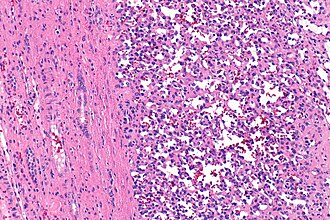Difference between revisions of "Anastomosing hemangioma of the kidney"
Jump to navigation
Jump to search
m (Michael moved page Anastomosing hemangioma to Anastomosing hemangioma of the kidney: make it into kidney article) |
|
(No difference)
| |
Revision as of 15:04, 25 November 2016
| Anastomosing hemangioma of the kidney | |
|---|---|
| Diagnosis in short | |
 Anastomosing hemangioma of the kidney. H&E stain. | |
|
| |
| LM | vascular tumour with architecture similar to splenic sinsoids, hobnailing, +/-hyaline globules, +/-extramedullary hematopoiesis |
| LM DDx | angiosarcoma, other hemangiomas, other vascular tumours |
| IHC | CD34 +ve, CD31 +ve, HHV-8 |
| Gross | brown/mahogany lesion, classically centered on medulla of kidney |
| Site | kidney, other |
|
| |
| Associated Dx | +/-end stage renal disease |
| Prevalence | very rare |
| Prognosis | benign |
Anastomosing hemangioma a rare benign vascular tumour that is typically found in the kidney and may mimic angiosarcoma.[1]
General
- Rare - case reports.
- Typically seen in end stage renal disease.[2]
Gross
Features:
- Mahogany/brown - centered on medulla of kidney.[2]
Microscopic
Features:
- Vascular tumour characterized by vessels that fuse/join (anastomose) - also described as splenic sinusoids-like.[2]
- +/-Hobnail morphology.
- +/-Cytoplasmic hyaline globules.
- +/-Extramedullary hematopoiesis.
- Nucleated red blood cells.
- Megakaryocytes.
Note:
- Tumour may extend into surrounding adipose tissue.
DDx:
- Angiosarcoma - nuclear atypia, more proliferative activity.
Images
IHC
Features:[2]
- CD31 +ve.
- CD34 +ve.
- HHV8 -ve.
See also
References
- ↑ Montgomery, E.; Epstein, JI. (Sep 2009). "Anastomosing hemangioma of the genitourinary tract: a lesion mimicking angiosarcoma.". Am J Surg Pathol 33 (9): 1364-9. doi:10.1097/PAS.0b013e3181ad30a7. PMID 19606014.
- ↑ 2.0 2.1 2.2 2.3 Kuroda, N.; Ohe, C.; Deepika, S.; Yorita, K.; Mikami, S.; Furuya, M.; Nagashima, Y.; Hes, O. et al. (Jun 2016). "Review of renal anastomosing hemangioma with focus on clinical and pathological aspects.". Pol J Pathol 67 (2): 97-101. PMID 27543862.









